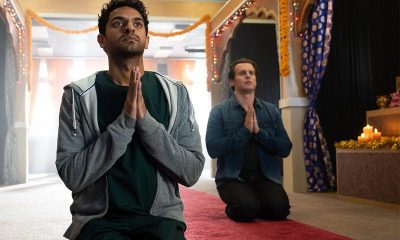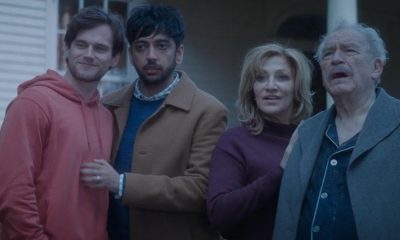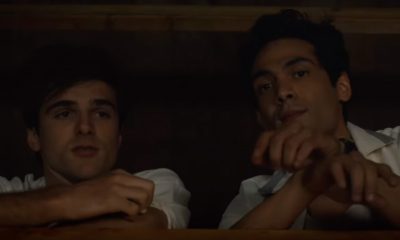Movies
‘Ganymede’ transcends camp to achieve genuine queer horror
An astute piece of social commentary

In Greek mythology, a young mortal named Ganymede possessed such beauty that Zeus himself chose to abduct the boy to Mount Olympus – which wasn’t such a bad deal, considering Ganymede was granted not just immortality to go along with his new job as cup-bearer to the gods, but eternal youth and beauty as well.
That’s not, however, how the story gets told – or rather, twisted – in the new movie “Ganymede,” the latest queer indie gem to debut on VOD platforms this summer, which uses the myth as the launchpad for a horror story that manages to be both campy and creepy at once. Directed by partners Colby Holt and Sam Probst (from Holt’s original screenplay) and set in a small town in the modern-day Bible Belt, it centers on high school wrestling star Lee (Jordan Doww), the only son of a deeply religious local politician (Joe Chrest) who runs his household with an iron fist. When gay classmate Kyle (Pablo Castelblanco) makes an effort to befriend him, he quickly develops feelings that put him at odds with his conservative upbringing; small-town gossip, as well as a dark family secret surrounding his mother (Robyn Lively, in a deliciously hysterical performance), soon have him under the controlling eye of his church’s fanatical pastor (David Koechner). Even more terrifying, his mind is being invaded by a ghostly, sinister presence that seems determined to drive him toward madness and self-destruction – unless Kyle can get to him first.
Like many of these queer-centric genre pictures, “Ganymede” emerged from the festival circuit, securing acclaim and awards throughout its run. With its unconcealed LGBTQ focus and religious homophobia at the core of its horror, it’s plain to see why it would strike a chord with queer audiences, especially in a time when conservative pushback against queer acceptance dominates the public conversation.
For “mainstream” horror fans, however, whose appreciation of the genre is generally focused on fright and gore rather than on the subtextual nuances of its tropes, Holt’s movie might not be the terrifying experience it aims to be — largely because he and Probst do not hide their LGBTQ perspective between the lines. It’s clear from early on that the gay love story upon which the plot hinges is exactly what it appears to be, and further, that it’s where our sympathies belong.
More than that, “Ganymede” inverts the supposed moral order of traditional, old-school horror narratives by framing the forces of religion – or at least, a weaponized form of it – as the source of the story’s true evil. Despite the “haunting” that plagues the film’s young protagonist from almost the very beginning, the supernatural elements of the story (spoiler alert) remain localized within his own mind, only manifesting in the real world – with one important but ambiguous exception – through his reactions to them, and it doesn’t take a film scholar to figure out that they are not the real threat to his well-being. For Holt and Probst, the evil doesn’t come from outside the real world, but from within the darkest corners of a stunted human imagination that projects its own pre-programmed ideas onto that world and treats anything that conflicts with them as an existential threat. In truth, it’s the same message one can find in horror classics from “Bride of Frankenstein” to “The Wicker Man” to the notoriously gay “Nightmare on Elm Street 2” – but in this case, it is delivered not by implication but by direct and obvious assertion.
It’s this point that might keep Holt’s film from satisfying the conventions of traditional horror filmmaking, but it’s worth observing that it’s also this point that makes it stand out. By refusing to conform to generic expectations, it represents a powerful cultural shift, in which the queerness of its premise no is no longer a transgressive statement of countercultural themes, but in fact becomes the “normal order” that is being threatened by perverse powers that seek to tear it down – and those perverse powers are the very “norms” that have so long cast all “otherness” in a monstrous light.
The bottom line for most film audiences, of course, be they queer or not, is whether the movie succeeds in scaring them – and if we’re being honest, it does so only in the sense that it confronts us with the horrific bigotry and abuse that is heaped upon LGBTQ existence from right-wing religious hate. That means, even for queer audiences, it’s not so much a horror movie as it is a disturbing allegory about the torment of being forced to suppress one’s true self in order to feign the safe conformity required for self-preservation. Frankly, that should be scary enough for everyone, regardless of whether the movie adheres to accepted genre form, to keep them trembling in their shoes over the prospect of a world dominated by such a deranged mentality; after all, it’s not just queer people who stand to be subjugated, suppressed, and worse in a world controlled by a strict and deeply biased interpretation of outdated beliefs – it’s anybody who would dare to suggest that those beliefs might deserve an extinction as final as the one experienced by the dinosaurs.
Going a long way toward making the whole thing work – besides the sureness of Holt’s direction, that is, which fully embraces the traditions of the genre (hence the aforementioned campiness) while treating the story as a realistic thriller with genuinely high stakes – is a cast that delivers performances several cuts above what we are use to seeing in such movies. Doww is a compelling and convincing lead, who never devolves into over-the-top histrionics, while Castelblanco triumphs in embodying the determined heroism required of his position in the plot while still maintaining an unashamedly femme-ish queer persona; we never doubt his ability to turn the tide, nor the natural and unforced chemistry the two actors find together. They find stellar support from the aforementioned Lively, as well as from Chrest – a domineering patriarch who would be the most terrifying figure in the film if it weren’t for Koechner’s chillingly authentic pastor, whose buried self-loathing is nevertheless painfully clear as he bullies and tortures the young Lee in the name of “conversion.”
Which brings us back to the significance of the title, and its roots in Greek mythology, where it was born as a tale of transcendence; in the warped minds of the film’s religious leaders, it becomes the opposite, a story of deliberate corruption perpetrated against so-called “decent” men by monsters who tempt them with “unnatural” desires. More than anything, perhaps, it’s that flourish of the screenplay that makes “Ganymede” an astute piece of social commentary, whether or not it succeeds as a horror film; in warping the understanding of that ancient tale into a justification for cruelty and repression, it underscores the toxic effects of clinging to a dogma that pretends to be truth while casting other viewpoints as the products of malevolent influence. That’s a delusion that has reached crisis levels in American society – and it’s why “Ganymede” is a must-see whether it’s a true horror film or not.
Movies
Infectious ‘Egghead & Twinkie’ celebrates love and allyship
Lesbian teen takes journey to self-acceptance with straight BFF
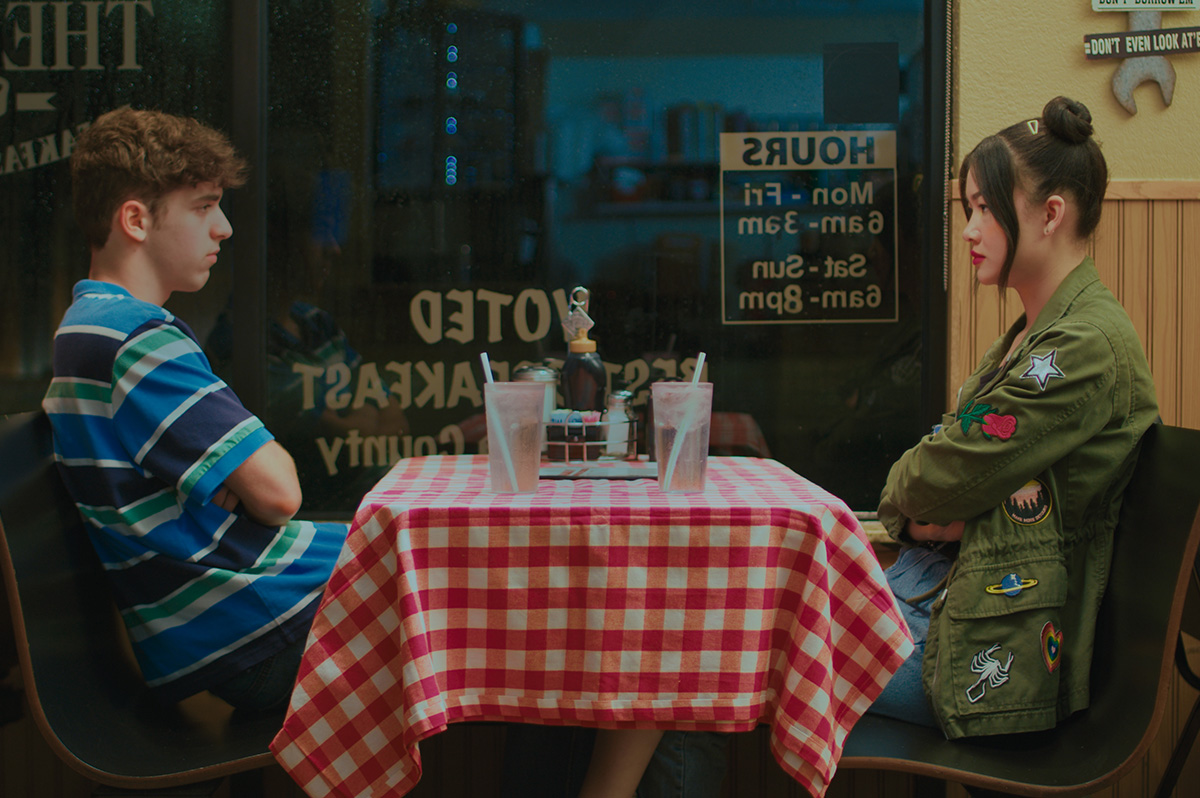
If you’ve ever wondered why so many queer movies are are coming-of-age stories, it might be that you were lucky enough to go through the transition into young adulthood without having to worry about your sexual alignment or gender identity being acceptable to your family or your friends or the world at large – and if that’s the case, we are truly happy for you. That’s the way it should be for everyone.
Unfortunately, it’s not. For many millions of queer kids, growing up is still an experience fraught with fear, shame, and very real peril, and this was true even before the current era of government-sanctioned homophobia and bigotry. It’s never been easy to become who you are when you’re surrounded by a family or community that refuses to accept who you are. It’s as near a “universal” queer experience as one can imagine in a demographic as diverse as ours, and it reinvents itself with each new generation – so there will always be an appeal for queer audiences in stories which express that often painful odyssey in a way that makes us feel “seen.”
That’s why “Egghead & Twinkie” – a 2023 film fest fave only now getting a VOD release (on April 29) – is such a welcome and refreshing addition to the genre. A passion project from Asian American filmmaker Sarah Kambe Holland, who expanded it into a feature from a “proof-of-concept” short she made in 2019, it brings a Gen Z perspective, which makes it as unique and contemporary as it is recognizable and relatable.
Set in suburban Florida, Holland’s movie centers on the relationship of its two title characters. “Egghead” (Louis Tomeo) and “Twinkie” (Sabrina Jie-A-Fa), childhood friends with a deep bond from growing up across the street from each other, face a crossroads as the cute-but-nerdy Egghead prepares to depart for college, leaving behind Twinkie – an Asian-American adoptee raised by socially conservative white parents who is one year his junior – just as she is beginning to come to terms with her long-hidden lesbian identity. Planning to connect with her social media crush (Ayden Lee) at a nightclub event in Texas, she enlists Egghead to accompany her as she “runs away” from her restrictive parents into the arms of a girlfriend she has never actually met in person, at a bar she’s too young to get into. Needless to say, it’s not a great plan – especially since the straight Egghead has long-hidden feelings of his own for his BFF – but it leads to a shared adventure in which they each must redefine both their feelings and their commitment toward each other, while staying one step ahead of her frantic family and dealing with the mishaps inherent in taking an impromptu cross-country road trip in a car you stole from your father.
There’s a youthful verve to the whole affair, punctuated with the inevitable irony that comes from watching it unfold through the eyes of age and experience – something that younger viewers may appreciate less than its spirit of boldness and (admittedly comedic) rebellion – and embellished with a visual aesthetic that reflects both Holland’s background as a YouTube “content creator” and the lead characters’ shared love of comics and animé; but what gives the film that extra “oomph” and makes it feel more significant than many of the other youth-oriented queer entertainments of recent years is not so much about the style of its storytelling as it is the nature of the relationship at its core.
Though “Egghead & Twinkie” is unequivocally a queer coming-of-age movie – which certainly deals with its teen lesbian protagonist’s journey to self-acceptance and includes an unexpected but irresistible connection with a fellow queer Asian American teen (Asahi Hirano) she meets along the way, unapologetically endorsing the validity of its heroine’s romantic pursuit, however misguided it may seem – it is ultimately a film less about queer identity than it is about friendship. While it allows ample opportunity for Twinkie to refine her values and learn from the mistakes of her rebellious quest for self-acceptance, it never loses sight of the fact that her long-term relationship with Egghead is one of mutual support and unconditional love. More than a romance, this YA-ish story of love beyond sexuality is a tale of true allyship, in which the unconditional understanding between friends – between fellow living beings – becomes more important than the romantic fantasies of a more naive conception of queer existence. It’s a love story, to be sure, but the love it lifts up is the kind ultimately has little to do with questions of sexual identity; instead, it’s the kind that transcends biology and sexuality to express something arguably more essential – the genuine emotional bond between two kindred souls that has nothing to do with either, but rather draws its power from shared experience and mutual acceptance. It’s that rarest of movies that celebrates the value and importance of platonic love that stretches across personal boundaries or divides, and ultimately reinforces the connections of shared humanity as being at least as much important as those created by our sexual makeup. It’s a love story between friends, not a romance between strangers, and the fact that its platonic protagonists are able to find the value of their connection beyond juvenile assumptions and impulses makes it arguably a more mature and insightful experience than even the most idealistically rendered young-love fantasy could ever hope to be.
Of course, its success in achieving that goal hinges on the chemistry between its two young stars, and both Jie-A-Fa and Tomeo capture that alchemical magic with natural ease; both performers originated their roles in the short that inspired the feature, and the familiarity of their chemistry goes a long way toward making it work. Additionally, the performances of both Hirano and Lee – indeed, even of Kelley Mauro and J. Scott Browning as Twinkie’s clueless but ultimately loving adoptive parents – avoid the kind of judgement and clichéd convention that might otherwise make them predictable stock caricatures.
In the end, though, it’s the hopeful, humanistic vision of Holland – who also wrote the screenplay – that informs “Egghead & Twinkie” and helps it resonate beyond the typical, In crafting a queer coming-of-age story that has less to do with sexual wiring than the need for the grounding, life-affirming reinforcement that comes from unconditional love, she has managed to craft a vibrant, hopeful, and heartfelt testament to the power of real humanity to overcome and transcend the prejudices and boundaries imposed by a social order that hinges on conformity over individual fulfillment.
That’s not just a queer issue, it’s a human issue – which is why this sweet, charming, and genuinely funny teen “non-romcom” captures us so willingly and so completely.
Movies
Heartfelt ‘Wedding Banquet’ remake a romcom worth seeing
Mishaps, crossed wires, conflicts are all part of the fun
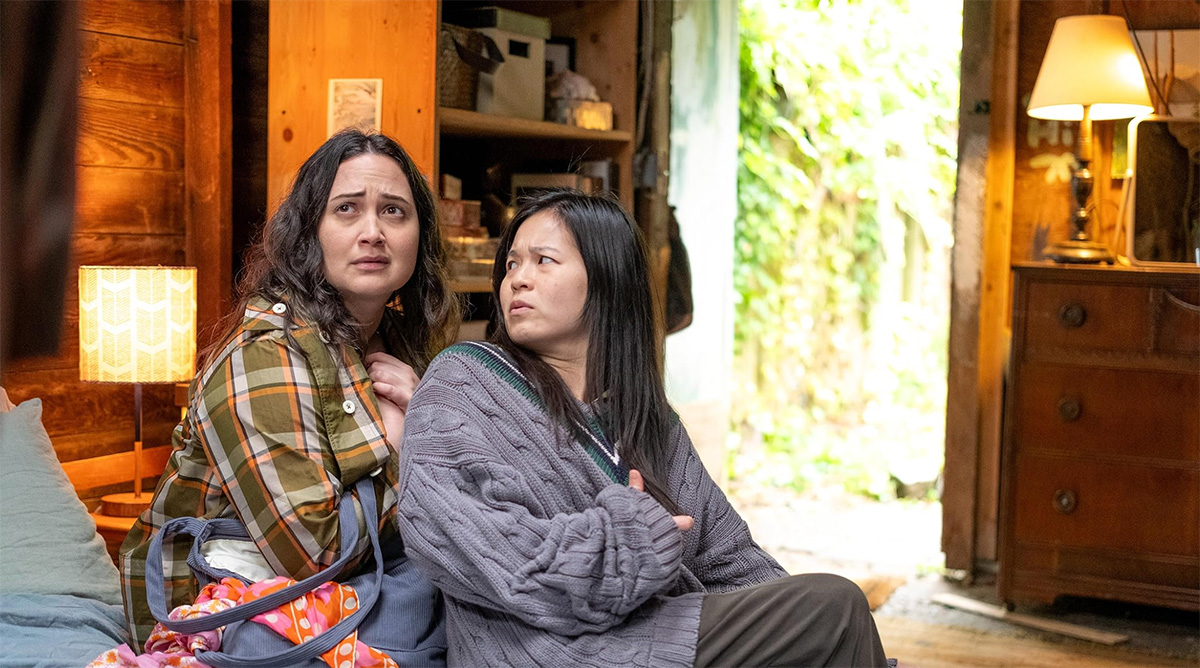
Creating a worthy remake can be a tricky proposition, especially when the movie being remade is a beloved classic – but that doesn’t mean it’s an impossible one.
Consider Andrew Ahn’s new version of 1993’s “The Wedding Banquet,” a film that put future “Brokeback Mountain” director Ang Lee on the proverbial map in America, which opens in theaters this weekend after a debut at Sundance earlier this year. The original, an American/Taiwanese production which became a surprise hit in the U.S., broke ground with its story — a culture-clash comedy of manners about a queer romantic triangle attempting to stage a sham wedding, it was quickly embraced by LGBTQ audiences thrilled to see representation on the big screen – and positive representation, at that – in an era when it was even scarcer than it is today. To undertake a remake of such a film is a bold move, to say the least.
Yet gay Korean American writer/director Ahn (“Spa Night,” “Fire Island”) has built his blossoming career on films about queer relationships among Asian American characters, with as much (or more) emphasis on family, both biological and chosen, as on romantic partnership; It seems natural, perhaps, for him to reinterpret this influential classic through his own lens, and he’s already proven himself as a filmmaker whose strengths line up perfectly with the material.
Even so, Ahn hedges his bets, perhaps, by collaborating on the new screenplay with James Schamus, who also co-wrote the original (along with Lee and Neil Peng), and the result is a movie that – although it recrafts the original romcom for a newer age and reconfigures its central relationships a bit to “up the ante” on its complications – stays relatively faithful to the broad strokes of its plot.
In this iteration, the New York setting is transposed to Seattle, and the plot revolves around not just one queer romance, but two: Chris and Min (Bowen Yang and Han Gi-Chan), a stalled grad student and his South Korean boyfriend, and their lesbian friends-and-landladies Lee and Angela (Lily Gladstone and Kelly Marie Tran), who are struggling to become parents through expensive IVF treatments. Min, an artist whose temporary visa is about to expire, wants to stay with Chris and build a life in America, but his grandmother (Youn Yuh-jung) – currently running the vast family business empire to which he is heir – wants him to come home and claim his place in the organization. A wedding to Chris would secure him the green card he needs to defy his grandmother’s demands, but it would also mean outing himself as gay and potentially being cut off from his inheritance. As a solution, he offers to pay for Lee and Angela’s fertilization procedure in exchange for a “green card wedding” with the latter, ensuring that he can remain in the U.S. while also remaining in the closet to his family.
Of course it’s an idea as bad as it sounds, but despite some reticence, the couples agree to the plan; but when Grandmother decides to come to America and meet the bride in person, the four of them must attempt to pull off a masquerade that escalates far beyond their expectations after she insists on putting on a traditional – and elaborate – Korean wedding worthy of her grandson’s exalted status, all while wrestling with the ambivalence and doubts that begin to encroach on their relationships as the scheme begins to fray at the edges.
Those who’ve seen the original already know that things don’t play out exactly as planned – and anyone who hasn’t won’t be surprised when it doesn’t, anyway. We already told you it was a bad idea.
That, of course, is the charm of the romcom, a genre in which mishaps, crossed wires and conflicts are all part of the fun, and in any case it gives Ahn’s film the opportunity to explore – as Lee did with the original – the more serious and relatable challenges of reconciling our queerness with the deeply ingrained traditions of our cultural backgrounds; he does so with gentle wit and an equal measure of respect, but he’s not above getting laughs by pointing up the sheer absurdity that sometimes goes along with the process. Neither does he hesitate to delve into the messiness of queer relationships, even (and perhaps especially) with lifelong friends, or the deep insecurities and self-criticisms which get in the way of sorting them out.
To these ends, “Wedding Banquet” relies heavily on its cast, who embrace and clearly relish the chance to flesh out these characters. Yang brings his inevitable “SNL” star power to the table but downplays the wackiness in favor of a more nuanced tone, and Gi-Chan shines as his pragmatically idealistic partner; Gladstone’s intelligence and authenticity is a grounding force, while Tran counterpoints her with an eminently likable turn as her spunky-but-anxious misfit of a girlfriend – and the resonance they each bring to the prospect of motherhood highlights the longing for family and legacy that so many queer couples carry as they build their lives together.
It’s not all about the couples, though. Veteran Chinese American actress Joan Chen (“Tai Pan,” “Twin Peaks”) is a scene stealer as Angela’s hyper-supportive mom, whose participation in her daughter’s “lavender wedding” requires her to go against her deepest instincts as a proud ally, and Bobo Le provides a further connection to the theme of family with a charming performance as Yang’s tomboy-ish little sister. The anchoring performance, however, comes from acclaimed Korean star Yuh-jong, whose shrewd, savvy, and staunch portrayal of Gi-Chan’s power-player grandma adds a much-needed dose of level-headed wisdom into the midst of the whirlwind.
In the end, Ahn’s update of Lee’s classic comedy scores big points for honoring the original’s message of acceptance and embracing the notion of reimagining our traditional ideas about family structure to meet the needs of an ever-changing world; it also succeeds in maintaining a heartfelt sense of empathy for each of its characters, all of whom appeal to us precisely because of their imperfections and their hangups. None of them are perfect, but all of them are perfectly human, which goes a long way toward making Ahn’s remake feel like more than just the slickly-made feel-good romcom it resembles.
And yet, given the screwball potential and the endless possibilities for farcical developments in the convoluted deception attempted by its sets of lovers, Ahn’s “Wedding Banquet” could have been funnier. Leaning into an idealized and sentimental perspective as it gracefully brings its characters’ lives into place, it occasionally feels a bit “precious,” too “Hollywood” to be believed.
Again, however, this is part of the charm of the romcom: if generations of straight audiences have gotten the chance to buy into idealized big screen fantasies about life and love, then why shouldn’t we enjoy the same privilege?
With that in mind, “The Wedding Banquet” makes for a perfect opportunity to entertain and validate ourselves – and even if it doesn’t tickle your funny bone, it’s a generous enough feast for your queer soul that it deserves you to see it.
Just make sure you bring somebody special to share your popcorn with.
Movies
An ‘Indian Boy’ challenges family tradition in sweet romcom
Refreshing look at what is possible when a family is willing to make changes

For queer audiences hungry for representation, nothing says “I feel seen” quite as much as a good queer romcom.
Perhaps it’s because love stories are universal, differing from culture to culture in the surface details only, and therefore have the potential for helping straight audiences understand a different kind of love a little better; or perhaps, in seeing our kind of love displayed so publicly, we feel a sense of validation. Whatever the reason, it rings our bell.
Maybe that’s why the quest for the first “great gay romcom” has continued to be a driving factor in the ongoing history of queer cinema, setting up an expectation in the mainstream that has, perhaps inevitably, fallen short of creating it. Fortunately, there are some efforts that have risen above the pressure to simply be what they are, instead of being the answer to everybody’s prayers for acceptance, and in so doing have managed to come close.
“A Nice Indian Boy” is just that kind of movie. Adapted from a play by Madhuri Sheka (by Eric Randall, whose screenplay made Hollywood’s buzzy “Black List” of un-produced scripts in 2021) and directed by Canadian-born Indian filmmaker Roshan Sethi, it might come closer to presenting an entirely successful gay romcom than most of the other overthought efforts that have come before.
It centers on Naveen (Karan Soni), a 30-something gay doctor, whose South Asian Indian family has long since accepted and supported his orientation but still struggles to reconcile it with their traditional beliefs. Enter Jay (Jonathan Groff), a white freelance photographer who grew up as an adoptee to Indian parents, and of course it’s love at first sight. A whirlwind courtship leads to a proposal, but there are a lot of considerations that must be met before the smitten couple can achieve the “big Indian wedding” of their dreams. The one that looms largest is gaining the approval of Naveen’s progressive-but-devout Hindu parents (Harish Patel and Zarna Garg) – not to mention his discontented sister (Sunita Mani) – whose confusion over his new fiancé’s ethnicity is just one of many obstacles they face in making their dream nuptials a reality. Intensifying that challenge – frequently to comedic effect – is Naveen’s struggle with his own insecurities, which threaten to derail not only the wedding plans but his relationship with the emotionally open and unreservedly passionate Jay, too.
It’s a sweet and clearly heartfelt affair, with a few laugh-out-loud moments to be found, as well as the wry introspection of its neurotic lead character, whose self-questioning turmoils feel like a connecting thread to the work of Woody Allen – indeed, “Annie Hall” is even name-dropped in the film, suggesting a spirit of homage that can be traced in a reflection of that classic Oscar-winner’s title character through Jay’s quirkily unconventional personality.
At the same time, the movie marries its diverse cultural influences by drawing just as heavily from a love of “Bollywood” cinema, and one of its movies in particular, which both of its protagonists adore. That allows it to maintain an aura of lush, larger-than-life romanticism that counterpoints the amusingly endearing self-deprecation of its main protagonist; it also reflects in the movie’s colorful, lively visual aesthetic and its choice to share focus on an entire family of characters for a more sweeping perspective.
As for its handling of the subject of race, despite its clear (and queer) twist on the “Guess Who’s Coming to Dinner?” trope of a family’s surprise over a bi-ethnic romance in its midst, “Indian Boy” doesn’t spend much time worrying about a love connection shared across racial divides; and while it gets considerable comic mileage out of Naveen’s parents’ well-intentioned but clueless efforts to show their acceptance of their gay son, the queerness of his relationship is not really an issue in itself. Rather, the conflict comes – for all of the movie’s primary characters, not just for the couple in the middle – from the difficulty of finding harmony between old customs and a new world that no longer fits within their boundaries.
Admittedly, Sethi’s movie sometimes feels a little too sentimental to be believed; it paints an aspirational picture – a true-love romance between a successful doctor and a rising artist – and tugs even harder on our heartstrings with its depictions of clumsy-but-sincere acceptance from the family around them; and while we don’t want to spoil any surprises, when it comes time for the big finale, it pulls out all the feel-good stops. Cynics in the audience might fail to be as enchanted as it wants them to be.
And yet, it all works wonderfully, largely because of its cast. Soni and Groff have an instantly tangible chemistry, and their differing personalities complement each other perfectly. Individually, they take us with them on their personal journeys with just as much clarity and conviction, and the movie would fall flat without the strength of their performances at its core.
Equally superb, however, are Patel and Garg, whose discomfort over the preparations for their son’s wedding never feel like they come from anywhere but love and a desire to share in his happiness; and Suri, whose considerable comedic talents contrast to great effect with the brewing discord within her character, lends a much-needed weight to the mix while still managing to glow alongside all her costars.
Combined with the sharp, funny, and insightful script and the generosity of Sethi’s directorial approach, which frames each character with respect and import to the story, it all makes “A Nice Indian Boy” a nice crowd-pleasing movie to see. It may or may not be “the great gay romcom,” and it might all seem a bit too glossy and perfect for some viewers’ taste – but it offers a refreshing look at what is possible when a family is willing to make changes in their way of life simply for the sake of love. What message could be more positive than that?
“A Nice Indian Boy” is now playing in theaters.
-

 Federal Government2 days ago
Federal Government2 days agoHHS to retire 988 crisis lifeline for LGBTQ youth
-

 Opinions2 days ago
Opinions2 days agoDavid Hogg’s arrogant, self-indulgent stunt
-

 District of Columbia2 days ago
District of Columbia2 days agoD.C. police seek help in identifying suspect in anti-gay threats case
-

 Opinions2 days ago
Opinions2 days agoOn Pope Francis, Opus Dei and ongoing religious intolerance

